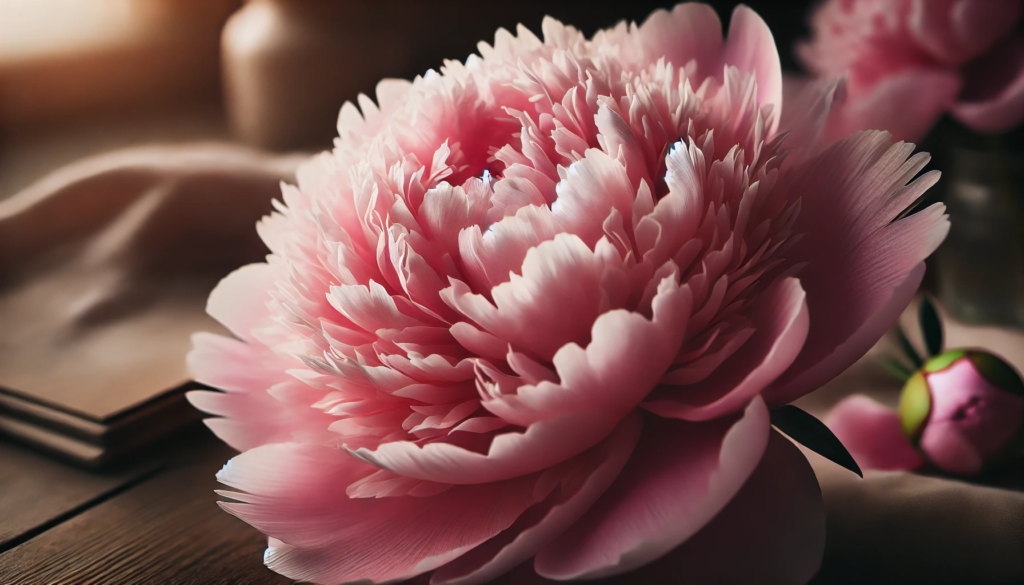Peonies are known for their lush, full blooms and vibrant colors, making them a favorite in gardens and floral arrangements. However, beyond their beauty, peonies carry rich symbolic meanings that have made them a symbol of love, honor, prosperity, and romance for centuries. This guide delves into the deeper meaning and symbolism of peonies, exploring how this single flower can evoke powerful emotions and connections.
The Symbolism of Peonies
Peonies hold significant cultural and symbolic meanings across different parts of the world. Their large, intricate blooms have been associated with a variety of positive virtues, including romance, honor, and wealth. Understanding the symbolism of peonies can deepen your appreciation for this flower and make it more meaningful when given or received.
1. Love and Romance
Peonies are widely regarded as a symbol of love and romance, often featured in wedding bouquets and romantic occasions. Their soft, delicate petals and luxurious blooms make them the perfect flower to express deep emotions and affection.
- Historical context: In Victorian England, peonies were exchanged as tokens of love, and the flower became a symbol of beauty and grace. Even today, their large, romantic blooms are often used to convey passionate feelings.
- Wedding significance: Peonies are popular choices for bridal bouquets, symbolizing a happy marriage, romance, and prosperity. Their opulent appearance aligns with the idea of a grand and flourishing relationship.
2. Prosperity and Good Fortune
In many cultures, particularly in China, peonies are revered as a symbol of prosperity, wealth, and good fortune. They are sometimes referred to as the “King of Flowers” and are used in celebrations and as decorative elements in homes and gardens.
- Feng Shui: In Feng Shui, peonies are believed to attract good luck and wealth. Images of peonies are often placed in homes to bring in positive energy and abundance.
- Wealth and status: Historically, peonies were grown in the gardens of emperors and noble families in China, where they were considered a sign of wealth and status. Today, they continue to represent affluence and success.
3. Honor and Compassion
Peonies are also a symbol of honor, compassion, and respect. In certain cultures, they are given as gifts to show admiration and appreciation. Their grand blooms and dignified presence make them ideal for honoring someone’s achievements or showing respect for elders.
- In Japan: Peonies symbolize bravery, honor, and good fortune. They are often depicted in art and tattoos to represent strength and honor.
- Respect and admiration: The peony’s majestic appearance conveys a sense of admiration and reverence, making it an appropriate gift for expressing respect.
4. Healing and Beauty
Beyond their symbolic meaning, peonies have been valued for their healing properties in traditional medicine. The flower has been used to treat various ailments and promote health.
- Medicinal uses: In traditional Chinese medicine, peonies were used to treat inflammation and ease pain. The root of the peony plant is still used today in some herbal remedies.
- Symbol of health and beauty: Because of their association with healing, peonies are also viewed as symbols of health and well-being. Their beauty is often seen as a reflection of inner harmony and balance.
5. Shame and Modesty
Interestingly, in some cultural contexts, peonies also represent shame or modesty. This duality in symbolism comes from ancient myths and legends, where the peony’s large, showy flowers were said to cause feelings of embarrassment due to their boldness.
- Mythological roots: In Greek mythology, the peony is named after Paeon, a physician to the gods who used the plant’s healing powers. However, the boldness of the flower led to the idea that its beauty might cause feelings of self-consciousness or modesty.
Cultural Importance of Peonies
Peonies have a deep cultural significance in many countries, particularly in East Asia. They are often associated with beauty, elegance, and wealth, and they appear frequently in art, literature, and festivals.
1. China: The King of Flowers
In Chinese culture, peonies are known as the “King of Flowers” and are considered a symbol of royalty, wealth, and honor. The flower has been cultivated in China for over 2,000 years and is celebrated for its beauty and grandeur.
- Cultural celebrations: The peony is the official flower of Luoyang, China, where an annual Peony Festival is held to celebrate its beauty. The festival attracts visitors from all over the world to admire peony gardens in full bloom.
- Symbol of national pride: Peonies are often used in Chinese art, embroidery, and pottery to symbolize wealth and prosperity. They are also frequently depicted in traditional Chinese paintings.
2. Japan: Symbol of Honor and Courage
In Japan, peonies symbolize honor, courage, and good fortune. They are often depicted in traditional Japanese tattoos (Irezumi) as symbols of strength and beauty. In Japanese gardens, peonies are carefully cultivated and admired for their grace.
- Tattoo symbolism: Peonies in Japanese tattoos often represent prosperity, boldness, and a balance between beauty and strength. They are commonly used in combination with other motifs, such as dragons or tigers, to signify balance between power and delicacy.
Peony Colors and Their Meanings
The symbolism of peonies can also vary depending on their color. Different colors of peonies carry unique meanings, which can add depth to their symbolism when used in bouquets, gardens, or decorations.
1. Pink Peonies
- Symbolism: Romance, love, and prosperity.
- Use: Often used in weddings or romantic gestures, pink peonies symbolize heartfelt affection and are a favorite for bridal bouquets.
2. White Peonies
- Symbolism: Modesty, purity, and new beginnings.
- Use: White peonies are often used to express sincerity and are appropriate for weddings or to symbolize a fresh start.
3. Red Peonies
- Symbolism: Passion, honor, and respect.
- Use: Red peonies are bold and dramatic, making them a perfect choice for expressing deep emotions, passion, or admiration.
4. Yellow Peonies
- Symbolism: Happiness, optimism, and new opportunities.
- Use: Yellow peonies represent joy and positivity, making them ideal for celebrations or congratulatory arrangements.
Conclusion
Peonies are much more than just beautiful flowers; they are rich with symbolism and meaning that spans love, honor, prosperity, and healing. Their lush, luxurious blooms have made them a favorite in gardens and floral designs, while their deep cultural significance adds layers of meaning to their appearance. Whether you’re planting peonies in your garden, giving them as a gift, or using them in a wedding bouquet, they are a symbol of perfection, prosperity, and romance.
FAQ
What do peonies symbolize in weddings?
Peonies are a symbol of love, happiness, and prosperity, making them a popular choice for wedding bouquets and decorations. They represent a happy marriage and are thought to bring good fortune to the couple.
Why are peonies associated with wealth?
Peonies have long been considered a symbol of wealth and prosperity, especially in Chinese culture. Their large, luxurious blooms and association with royalty make them a symbol of affluence.
Are peonies good luck?
In many cultures, peonies are considered a symbol of good luck and fortune. In Feng Shui, they are believed to attract positive energy and bring wealth into the home.
Can peonies represent modesty?
Yes, peonies can also symbolize modesty or shyness, particularly in certain cultural contexts where their bold, showy blooms are seen as representing a sense of embarrassment or modesty.
What is the significance of pink peonies?
Pink peonies symbolize romance, love, and prosperity. They are often used in wedding bouquets and romantic arrangements to convey affection and heartfelt emotions.



